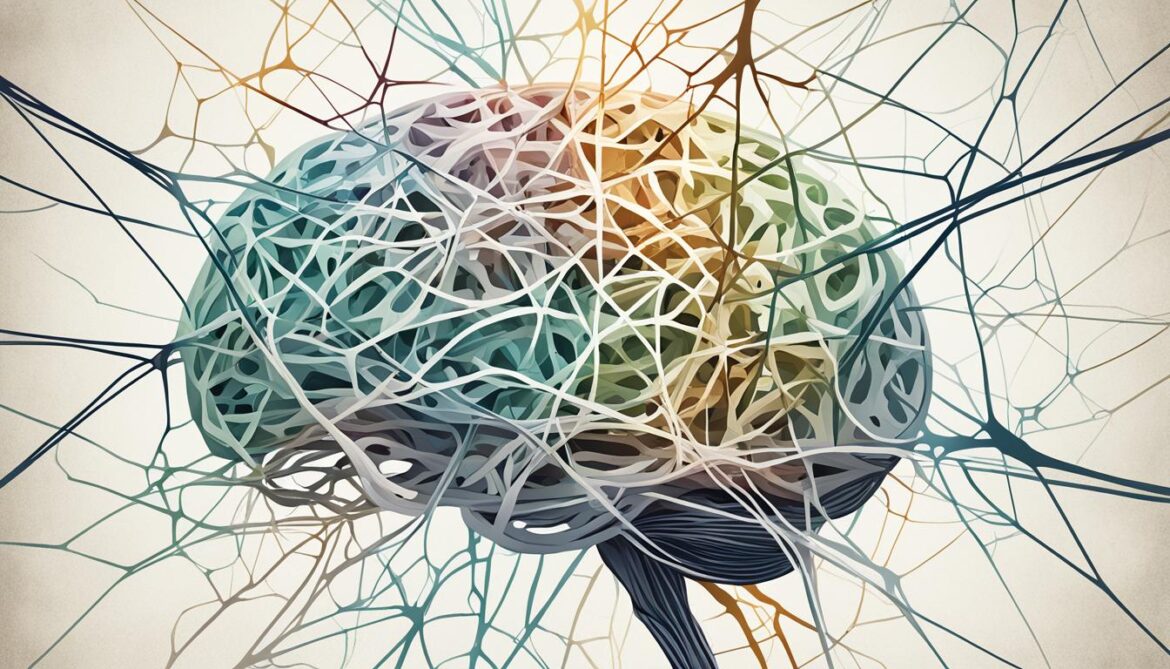The link between alcohol and dementia care is often missed and not fully understood. We aim to understand the complex issues that come up when these two conditions meet. This article will look into how alcohol affects brain function, the risks of getting dementia, and how to care for those with both alcohol and dementia.
We want to give a clear view of this complex topic. We aim to help caregivers, doctors, and those affected understand better. By looking at the link between alcohol and dementia, we hope to improve care and well-being for those dealing with these issues.
Key Takeaways
- The relationship between alcohol consumption and dementia care is intricate and often complex.
- Alcohol abuse can have a significant impact on cognitive function, leading to short-term and long-term effects on memory and thinking.
- Dementia risk factors are closely tied to alcohol consumption, and understanding these connections is crucial for prevention and care.
- Caregivers supporting individuals with alcohol-related and non-alcohol-related dementias face unique challenges, requiring specialized support and strategies.
- Substance abuse treatment and senior mental health services play a vital role in addressing the complexities of alcohol-related dementia.
Understanding the Complicated Relationship Between Alcohol & Dementia Care
Dealing with the link between alcohol and dementia care is tough. We explore how too much alcohol can harm the brain, making dementia care harder. This issue is complex and affects many people.
Alcohol-related dementias, like Wernicke-Korsakoff syndrome, are tough for caregivers and doctors. They cause memory loss, confusion, and problems with moving. This makes caring for these patients special and challenging.
Even non-alcohol-related dementias, like Alzheimer’s, can be affected by drinking too much. Drinking a lot can raise the risk of getting some types of dementia. This shows why dealing with alcohol use is key in dementia care.
| Dementia Type | Relationship to Alcohol Consumption |
|---|---|
| Alcohol-Related Dementias | Directly caused by the neurological effects of chronic alcohol abuse, such as Wernicke-Korsakoff syndrome |
| Non-Alcohol-Related Dementias | Increased risk of developing certain types of dementia, such as Alzheimer’s disease, due to the detrimental effects of excessive alcohol consumption on brain health |
Understanding the complicated relationship between alcohol and dementia care helps healthcare workers and caregivers. They can tackle the challenges better, making life better for those with these conditions.
Alcohol Abuse and Cognitive Impairment
Alcohol abuse can deeply affect our thinking skills, both now and later. It’s key to know these effects to help those with dementia.
Short-Term Effects on Memory and Thinking
Drinking alcohol, even a bit, can make our thinking slow. It can make it hard to remember new things, process info, and decide. This is tough for people with dementia, as it makes their thinking harder.
Long-Term Impact on Brain Function
Drinking too much over time can cause serious, lasting brain damage. This is called alcohol-related brain damage (ARBD). ARBD can lead to memory loss, trouble solving problems, and changes in how someone acts. These effects make caring for someone with dementia even harder.
| Cognitive Impairment | Short-Term Effects | Long-Term Effects |
|---|---|---|
| Memory | Difficulty forming new memories | Significant memory loss |
| Thinking and Processing | Slower information processing | Impaired problem-solving and decision-making |
| Personality and Behavior | Temporary changes in mood and behavior | Persistent personality changes and behavioral issues |
Knowing how alcohol abuse affects thinking skills helps us support those with dementia and their caregivers. It makes it easier to face the challenges they have.
Dementia Risk Factors Associated with Alcohol Consumption
Exploring the link between alcohol and dementia is crucial. We must understand the risks that can lead to cognitive decline. Alcohol abuse is a big risk for dementia, and their connection is complex.
How much and how long someone drinks matters. Drinking a lot over many years raises the risk of dementia, including Alzheimer’s and vascular dementia. When and how often someone drinks also affects their brain health.
Other factors like age, genes, and health conditions can make alcohol more dangerous. For example, people with a family history of dementia might be more at risk from alcohol. This shows why we need to look at all the risks together.
Understanding how alcohol affects dementia risk helps us make better choices. It helps us and our loved ones get the right support. This could lower the chance of losing cognitive abilities.
“Alcohol abuse is a complex risk factor for dementia, with its impact shaped by factors like the amount, duration, and timing of consumption, as well as its interaction with other known risk factors.”
Knowing the risks of alcohol on dementia is key to preventing and treating it. By highlighting this complex relationship, we can help people make smart choices. We can also support them in keeping their minds healthy as they get older.
Caregiver Support and Challenges
Caring for a loved one with dementia and alcohol issues is tough. It requires empathy, patience, and the right resources. We’ll look at the challenges caregivers face and how to help. We’ll also talk about finding a balance between helping too much and giving the right support.
Coping with Substance Abuse in Dementia Patients
Alcohol use can make dementia symptoms worse, causing more confusion and mood changes. Caregivers need to know how to handle these issues. Joining support groups, counseling, and learning about addiction treatment can help them.
Enabling vs. Supporting: Finding the Right Balance
It’s hard for caregivers to know when to help and when to let their loved ones face the consequences. Helping too much can make things worse. Caregivers should set limits, push for treatment, and support recovery. They also need to give the emotional and practical help their loved ones need.
| Enabling Behaviors | Supportive Behaviors |
|---|---|
|
|
Supportive actions and advocating for treatment can help those with dementia and addiction. This way, they can face their challenges and keep their dignity and quality of life.

Substance Abuse Treatment for Seniors
As we age, our bodies and minds change a lot. This makes treating substance abuse in older adults complex. We need special care that meets their unique needs.
Specialized Approaches for Older Adults
Helping seniors with substance abuse means taking a holistic approach. This looks at their physical, mental, and emotional health. It’s important to consider their challenges with dementia and substance abuse.
- Tailored therapy methods that account for age-related cognitive impairments and physical limitations
- Integrated care that addresses both substance abuse and dementia, ensuring a comprehensive treatment plan
- Emphasis on building strong support networks and fostering healthy coping mechanisms
- Collaboration between healthcare professionals, community resources, and family caregivers
- Education and guidance for families on navigating the complexities of substance abuse and dementia in older adults
With these special methods, we can help seniors overcome substance abuse and cognitive decline. They can find recovery, resilience, and a better quality of life.
| Specialized Treatment Approaches | Potential Benefits |
|---|---|
| Tailored Therapy Methods | Address age-related cognitive and physical changes |
| Integrated Care | Treat both substance abuse and dementia concurrently |
| Strong Support Networks | Promote healthy coping mechanisms and long-term recovery |
| Collaborative Care | Leverage expertise of healthcare professionals and community resources |
| Family Education and Guidance | Empower caregivers to support older adults in recovery |
By using these special methods, we can help seniors with substance abuse and cognitive decline. They can find their way to recovery, resilience, and a better life.
“Providing substance abuse treatment for older adults requires a nuanced understanding of their unique needs and challenges. It’s not a one-size-fits-all approach, but rather a personalized journey towards healing and well-being.”
Alcohol-Related Brain Damage and Dementia
The link between alcohol and dementia is a growing concern. Alcohol-related brain damage often goes unnoticed but has big effects on dementia. It’s key to understand this link for better care and support.
Alcohol can lead to Wernicke-Korsakoff syndrome, a disorder from a lack of thiamine (vitamin B1). This can cause memory loss, confusion, and other thinking problems. If not treated, it can turn into a severe dementia, making health worse.
Other forms of alcohol damage, like alcohol-induced amnestic disorder and alcohol-related dementia, also exist. These can affect memory and brain health, raising dementia risk.
- Alcohol-related brain damage can increase dementia risk.
- Conditions like Wernicke-Korsakoff syndrome and alcohol-induced persisting amnestic disorder are linked to alcohol damage and dementia.
- Early treatment and therapies may lessen the effect of alcohol damage on dementia.
Recognizing alcohol-related brain damage and its link to dementia is key. This knowledge helps healthcare workers, caregivers, and patients make better choices. It leads to better prevention, early detection, and management of these conditions.
“Addressing alcohol-related brain damage is not just about managing the immediate effects, but also preventing the long-term impact on cognitive health and dementia risk.”
By focusing on alcohol-related brain damage and its link to dementia, we can help people and their caregivers. They can make informed choices, get the right support, and improve life quality for those dealing with these complex issues.
Senior Mental Health and Addiction Recovery
Senior mental health and addiction recovery can be tough, especially for those with dementia. Many seniors don’t get help because of the stigma. We need to tackle these issues with care and support.
Overcoming Stigma and Seeking Help
We must reduce the stigma around senior mental health and addiction. This will help older adults get the support they need. By talking openly and educating the community, we can make things better. Healthcare workers, support groups, and community resources are key in helping seniors and their families recover.
Addiction and mental health issues can hit anyone, even seniors. They face challenges like social isolation and health problems. With the right approach, we can help seniors get past these hurdles and recover.
“The first step towards recovery is acknowledging the problem and having the courage to ask for help. No one should have to face these challenges alone.”
Specialized treatment, support networks, and a caring environment can empower seniors. By focusing on their well-being and giving them the right resources, we can help them manage their mental health and addiction. This way, seniors with dementia can get the care they need to live better lives.
| Strategies for Overcoming Stigma | Community Resources for Addiction Recovery |
|---|---|
|
|
Responsible Drinking and Dementia Prevention
Exploring the link between alcohol and dementia shows that drinking in moderation might help keep our minds sharp. Studies hint that moderate drinking could lower dementia risk. But, this topic is complex and varies from person to person.
Finding the right drinking balance is key. Responsible drinking, which means one drink a day for women and two for men, might help prevent cognitive decline. Yet, it’s crucial to remember that this link isn’t the same for everyone. Things like genetics, lifestyle, and health can change how alcohol affects dementia risk.
- Moderate drinking could lower the risk of Alzheimer’s and other dementia types.
- It might help because it can improve heart health and reduce brain inflammation.
- But, heavy or irresponsible drinking can harm our brains, making us more likely to lose cognitive skills and age faster.
When thinking about dementia prevention, it’s important to drink with care. Making smart choices about how much we drink can help keep our brains healthy over time. It’s a fine line, but it’s an important one to walk for our mental health as we get older.
“Responsible drinking is not just about enjoying the moment, but about preserving our cognitive abilities for the future.”

Caregiving Strategies for Alcohol-Related Dementia
Caring for someone with alcohol-related dementia needs a detailed plan. It’s important to make a supportive space and help them cope well. As caregivers, we are key to making sure they live well despite the challenges.
Creating a Supportive Environment
It’s key to make a safe, structured, and caring space for those with alcohol-related dementia. This means:
- Reducing things that might make symptoms worse
- Having a routine that’s calm and predictable to lessen confusion and worry
- Helping them do activities that are meaningful to improve their mood and mind
- Making sure they can easily get to the things they need, like their medicine and support
Promoting Positive Coping Mechanisms
We also need to help those with alcohol-related dementia find healthy ways to cope. This could be by:
- Teaching them stress-reducing activities, like mindfulness or gentle exercise
- Encouraging them to join in social events and support groups for a sense of community
- Giving them information and resources to understand their condition and deal with it
- Working with doctors to get the right care and therapies
Using these caregiver support and caregiving strategies, we can make a caring space. This helps people with alcohol-related dementia handle their symptoms better and live better lives. Also, teaching coping mechanisms helps both the caregiver and the person being cared for to face this tough journey with strength and kindness.
The Role of Healthcare Professionals
Healthcare professionals are key in dealing with alcohol and dementia. They use their knowledge and skills for early detection and care. This ensures the best outcomes for those with these conditions.
Early Detection and Intervention
Doctors, geriatric specialists, and mental health workers lead in spotting early signs of dementia. They use regular check-ups and risk factor awareness. This helps them catch cognitive issues early and act fast.
Early action is crucial. It can slow disease progress, improve cognitive function, and better life quality for patients and caregivers. Healthcare teams work with patients and families to create care plans tailored to each person’s needs.
| Key Responsibilities of Healthcare Professionals | Practical Strategies for Early Detection and Intervention |
|---|---|
|
|
Healthcare professionals play a vital role in the care team. They make a big impact on individuals and families dealing with alcohol and dementia.

Legal and Ethical Considerations
When we care for people with dementia and alcohol issues, we face tough legal and ethical challenges. These issues are key to keeping our patients safe and respecting their rights and freedom.
One big legal worry is making decisions for our patients as they lose the ability to decide for themselves. We must figure out guardianship, power of attorney, and advance directives to protect them.
There are also big ethical questions. We have to balance our patients’ freedom, safety, and quality of life. Deciding if we should limit their alcohol access is one example. We must think about the good and bad sides of such decisions.
It’s vital to know about legal considerations and work with experts. Talking openly with patients, families, and caregivers helps us make the right and ethical choices.
Handling ethical considerations in caring for dementia patients with alcohol issues needs a careful, focused approach. By building trust and understanding, we can support our patients’ dignity and well-being. We also respect their rights and freedom.
| Legal Considerations | Ethical Considerations |
|---|---|
|
|
By tackling the legal and ethical challenges, we can give the best care to those with dementia and alcohol issues.
Conclusion
We’ve looked into how alcohol and dementia care are linked. This issue is complex and needs careful thought. We’ve seen how alcohol abuse affects cognitive impairment and dementia risk factors. We also talked about the challenges caregivers face and the special ways to help with substance abuse treatment.
Our aim is to make life better for people with alcohol-related brain damage and their caregivers. We want to help improve their mental health and support their recovery from addiction. By promoting responsible drinking and giving caregivers the right support, we can prevent dementia.
We hope our work helps us understand this big issue better. We want to help create solutions that meet the needs of individuals and their caregivers. Together, we can make life better for those dealing with alcohol and dementia.
FAQ
What is the connection between alcohol consumption and dementia?
Drinking too much alcohol can harm your brain and increase dementia risk. It can lead to brain damage and Wernicke-Korsakoff syndrome. But, the link between alcohol and dementia is not simple. It’s important to understand this complex relationship.
How does alcohol abuse affect cognitive function in the short and long term?
Drinking too much can hurt your memory and thinking skills right away. Over time, it can cause serious brain damage. This damage can depend on how much and how long you drink.
What are the key risk factors associated with alcohol consumption and dementia?
Many things can affect your dementia risk if you drink too much. These include how much and how long you drink, when you start, and your health history. Your age, genes, and other health conditions also play a part.
How can caregivers support individuals with both dementia and alcohol-related issues?
Caring for someone with dementia and alcohol problems is tough. You can help by focusing on their substance use, creating a safe place, and helping them cope. It’s also key to get the right support and learn how to care well.
What types of substance abuse treatment are available for older adults with dementia?
Older adults with dementia need special treatment for substance abuse. This might include medication, therapy, and support groups. These options help with both the addiction and dementia challenges.
How can alcohol-related brain damage contribute to the development of dementia?
Drinking too much can cause brain damage, like Wernicke-Korsakoff syndrome. This can lead to long-term brain changes. These changes increase dementia risk and make caring for someone with both conditions harder.
What role do healthcare professionals play in supporting individuals with alcohol-related dementia?
Doctors, nurses, and mental health workers are key in spotting and helping people with alcohol and dementia. They use their knowledge to work with caregivers and resources. This helps ensure the best care for those affected.
How can responsible drinking habits potentially help prevent dementia?
Some studies suggest that drinking in moderation might lower dementia risk. But, it’s important to think about your health and the risks before deciding on your drinking. The link between alcohol and dementia is complex.


